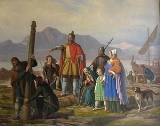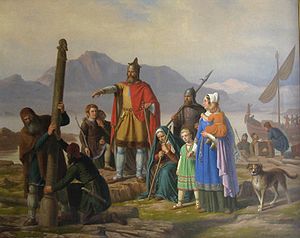
Ingólfur Arnarson
Encyclopedia

Nordic countries
The Nordic countries make up a region in Northern Europe and the North Atlantic which consists of Denmark, Finland, Iceland, Norway and Sweden and their associated territories, the Faroe Islands, Greenland and Åland...
settler of Iceland
Iceland
Iceland , described as the Republic of Iceland, is a Nordic and European island country in the North Atlantic Ocean, on the Mid-Atlantic Ridge. Iceland also refers to the main island of the country, which contains almost all the population and almost all the land area. The country has a population...
. According to Landnáma he built his homestead in (and gave name to) Reykjavík
Reykjavík
Reykjavík is the capital and largest city in Iceland.Its latitude at 64°08' N makes it the world's northernmost capital of a sovereign state. It is located in southwestern Iceland, on the southern shore of Faxaflói Bay...
in 874
874
Year 874 was a common year starting on Friday of the Julian calendar.- Europe :* Ingólfur Arnarson arrives as the first permanent Viking settler in Iceland, settling in Reykjavík ....
. Although recent archaeological finds
Reykjavík 871±2
Reykjavík 871±2 is an exhibition on the settlement of Reykjavík, Iceland, created by the Reykjavik City Museum . The exhibition is based on the archaeological excavation of the ruin of one of the first houses in Iceland and findings from other excavations in the city centre...
in Iceland suggest settlement may have started a little earlier, the date is probably not too far off.
The medieval chronicler Ari Thorgilsson said Ingólfr was the first Nordic settler in Iceland, but mentioned that "Papar
Papar
The Papar were, according to early Icelandic historical sources, a group of Irish or Scottish monks resident in parts of Iceland at the time of the arrival of the Norsemen...
" – i.e. Irish
Ireland
Ireland is an island to the northwest of continental Europe. It is the third-largest island in Europe and the twentieth-largest island on Earth...
monk
Monk
A monk is a person who practices religious asceticism, living either alone or with any number of monks, while always maintaining some degree of physical separation from those not sharing the same purpose...
s and hermit
Hermit
A hermit is a person who lives, to some degree, in seclusion from society.In Christianity, the term was originally applied to a Christian who lives the eremitic life out of a religious conviction, namely the Desert Theology of the Old Testament .In the...
s – had been in the country before the Norsemen
Norsemen
Norsemen is used to refer to the group of people as a whole who spoke what is now called the Old Norse language belonging to the North Germanic branch of Indo-European languages, especially Norwegian, Icelandic, Faroese, Swedish and Danish in their earlier forms.The meaning of Norseman was "people...
. He wrote that they left because they did not want to live amongst the newly arrived pagans
Paganism
Paganism is a blanket term, typically used to refer to non-Abrahamic, indigenous polytheistic religious traditions....
.
Landnáma (written two to three centuries after the settlement) contains a long story about Ingólf's settlement. The book claims he left Norway
Norway
Norway , officially the Kingdom of Norway, is a Nordic unitary constitutional monarchy whose territory comprises the western portion of the Scandinavian Peninsula, Jan Mayen, and the Arctic archipelago of Svalbard and Bouvet Island. Norway has a total area of and a population of about 4.9 million...
after becoming involved in a blood feud
Blood Feud
"Blood Feud" is the twenty-second and final episode of The Simpsons second season. It originally aired on the Fox network in the United States on July 11, 1991. In the episode, Mr. Burns falls ill and desperately needs a blood transfusion. Homer discovers Bart has Burns' rare blood type and urges...
. He had heard about a new island which Garðarr Svavarsson, Flóki Vilgerðarson
Flóki Vilgerðarson
Flóki Vilgerðarson was the first Norseman to deliberately sail to Iceland. His story is documented in the Landnámabók manuscript. He heard good news of a new land to the west, then known as Garðarshólmi....
and others had found in the Atlantic Ocean
Atlantic Ocean
The Atlantic Ocean is the second-largest of the world's oceanic divisions. With a total area of about , it covers approximately 20% of the Earth's surface and about 26% of its water surface area...
. With his close friend Hjörleifr Hróðmarsson, he sailed for Iceland. When land was in sight, he threw his high seat pillars (a sign of his being a chieftain) overboard and promised to settle where the gods decided to bring them ashore. Two of his slaves then searched the coasts for three years before finding the pillars in the small bay which eventually became Reykjavík
Reykjavík
Reykjavík is the capital and largest city in Iceland.Its latitude at 64°08' N makes it the world's northernmost capital of a sovereign state. It is located in southwestern Iceland, on the southern shore of Faxaflói Bay...
.
In the meantime, Hjörleifr had been murdered by his Irish slaves because of his ill-treatment. Ingólfr hunted them down and killed them in the Westman Islands (Vestmannaeyjar, named after the slaves).
Ingólfr was said to settle a large part of the south-western part of Iceland, but after his settlement nothing more was known. His son, Þorsteinn Ingólfsson, was a major chieftain and was said to have founded the first thing
Thing (assembly)
A thing was the governing assembly in Germanic and introduced into some Celtic societies, made up of the free people of the community and presided by lawspeakers, meeting in a place called a thingstead...
, or parliament
Parliament
A parliament is a legislature, especially in those countries whose system of government is based on the Westminster system modeled after that of the United Kingdom. The name is derived from the French , the action of parler : a parlement is a discussion. The term came to mean a meeting at which...
, in Iceland. It was a forerunner of the Althingi.
The name Ingolf, similar to the name Adolf that means "aristocratic wolf", would be translated as "royal or kingly wolf."

